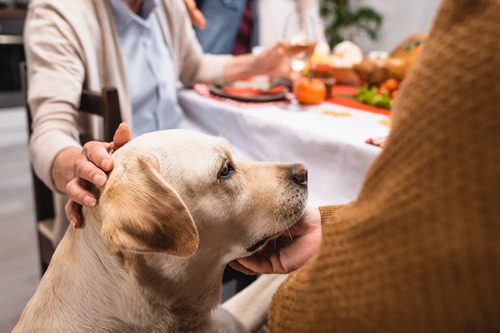Can Dogs Eat Mashed Potatoes?
Mashed potatoes are a holiday favorite, and your dog may be watching closely for a bite. Since not all human foods are safe for pets, many owners wonder: can dogs eat mashed potatoes?
Dogs can eat mashed potatoes only if they are plain and served in moderation, but most mashed potatoes made for people are not safe because they often contain butter, cream, salt, garlic, onions, or seasonings that can upset a dog’s stomach or lead to more serious health issues. Even when prepared safely, mashed potatoes are calorie-dense and may contribute to weight gain or digestive upset, especially in dogs with sensitive stomachs or health conditions like diabetes.
If you have questions about feeding mashed potatoes or other human foods, Auburndale Veterinary Clinic is here to help—call us at (863) 967-5854.

Are Mashed Potatoes Safe for Dogs?
Plain mashed potatoes, prepared without additional ingredients like butter, cream, garlic, or salt, are generally safe for dogs in moderation. Potatoes are a starchy vegetable and contain essential nutrients such as vitamin C, vitamin B6, and potassium, which can benefit dogs. However, the way mashed potatoes are prepared plays a significant role in determining their safety for your furry friend.
The Difference Between Canine & Human Diets
Dogs have different dietary needs than humans, and high-fat or high-sodium foods can cause digestive upset or other health issues. Many mashed potato recipes include ingredients that are harmful to dogs, so it’s important to carefully evaluate how the dish is made before sharing.
Key Nutritional Benefits of Potatoes for Dogs
When prepared plain, potatoes can offer dogs a few nutritional benefits:
- Energy Source: Potatoes are rich in carbohydrates, which can provide energy.
- Vitamins and Minerals: They contain vitamin B6, vitamin C, and potassium, all of which support overall health.
- Fiber: Potatoes offer some dietary fiber, which aids in digestion.
While these benefits can make potatoes a decent occasional treat, they shouldn’t replace your dog’s nutritionally balanced food. Always consult your veterinarian before making any significant changes to your dog’s diet.
Ingredients in Mashed Potatoes Your Dog Should Avoid
Although plain mashed potatoes are safe, most recipes include additives that can harm dogs. Before letting your dog indulge, make sure the mashed potatoes are free from the following ingredients:
Butter and Heavy Cream
Mashed potatoes often include butter and cream to enhance their texture and flavor. While these ingredients may taste delicious to us, they’re high in fat and can lead to weight gain or upset stomachs in dogs. Dogs that consume high-fat foods regularly may also be at risk for pancreatitis, a potentially serious condition.
Garlic and Onions
Garlic, onions, and other members of the allium family are toxic to dogs, even in small amounts. These ingredients can damage red blood cells, leading to anemia. Always double-check for these harmful ingredients, whether you’re preparing mashed potatoes at home or serving leftovers from a restaurant.
Salt and Seasonings
While small amounts of salt are not toxic, too much can cause dehydration or even salt poisoning in dogs. Additionally, seasonings like pepper, nutmeg, or paprika may irritate your dog’s stomach.
Are There Potential Risks of Feeding Mashed Potatoes to Dogs?
Even if the mashed potatoes are plain and free from harmful ingredients, there are a few risks to consider when offering them to your dog.
Risk of Weight Gain
Potatoes are calorie-dense, and their high carbohydrate content can contribute to weight gain if given frequently or in large amounts. Dogs with sedentary lifestyles or those prone to obesity should avoid starchy foods like mashed potatoes.
Digestive Upset
Some dogs may have sensitive stomachs and struggle to digest starchy foods, resulting in diarrhea or vomiting. If it’s your dog’s first time trying mashed potatoes, offer a small amount and monitor them for any adverse reactions.
Health Conditions Affected by Starch
Dogs with conditions like diabetes should avoid mashed potatoes, as the high carbohydrate content can spike blood sugar levels. Additionally, dogs with chronic gastrointestinal issues may not tolerate starchy foods well.
How to Safely Feed Mashed Potatoes to Your Dog
If you want to share mashed potatoes with your dog, preparation is key. Here are some tips to make the dish safe for your pup:
- Boil or bake plain potatoes without adding salt, butter, or seasonings.
- Avoid pre-made mashed potatoes, which often contain hidden ingredients like sodium and preservatives.
- Treat mashed potatoes as an occasional snack rather than a staple in your dog’s diet.
- Watch for any signs of digestive upset after introducing mashed potatoes to their diet.
Alternative Dog-Friendly Treats to Consider
If you’re looking for safer, healthier alternatives to mashed potatoes, there are plenty of dog-friendly options to explore. These alternatives are not only nutritious but also less likely to cause digestive upset or weight gain:
- Carrots: Low in calories and packed with vitamins, raw or cooked carrots make an excellent treat.
- Pumpkin: Plain, canned pumpkin is a fiber-rich option that supports digestion.
- Sweet Potatoes: Boiled or baked sweet potatoes are a nutrient-rich alternative to regular potatoes.
These options can be given as snacks or incorporated into your dog’s regular meals with your veterinarian’s guidance.
When Should You Contact Your Veterinarian?
If your dog accidentally consumes mashed potatoes containing harmful ingredients like garlic, onions, or excessive butter, monitor for symptoms such as vomiting, diarrhea, lethargy, or pale gums, and contact your veterinarian immediately. For advice on safe food options or to address any concerns about your dog’s diet, reach out to Auburndale Veterinary Clinic in Auburndale, FL. Our team is here to provide support and answer any questions you have. Call us at (863) 967-5854.
Recent Posts
About Us
Even long after they’re gone, we never forget our beloved pets. They make our families whole and bring so much joy to our lives. Our veterinarians and staff in Auburndale, FL know that the human-animal bond is sacred. To protect that bond, we aim to provide the highest level of medicine and the kindest, most compassionate care we can. Our goal is to help you help your pet stay healthy and happy for as long as possible. With wellness and preventative care, medical care for illnesses and injuries, routine surgery, dentistry and more, you can rest assured that all your pet’s needs are being met.

